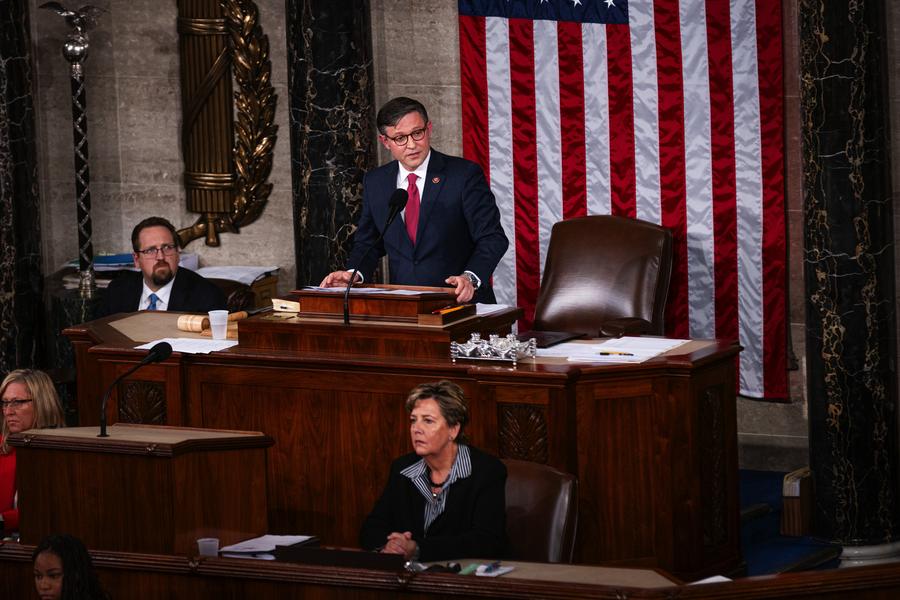
WASHINGTON - Republican Mike Johnson was elected House speaker Friday. But the GOP faces a tough road ahead, given its razor-thin House majority.
Johnson won re-election for the US House speaker in a slim Republican majority, after swaying two out of the three members of his party who had joined Democrats to block his bid.
The final vote tally was 218 to 216, with all 215 Democrats voting for minority leader Hakeem Jeffries, and Republican Congressman Thomas Massie of Kentucky voting for another candidate -- GOP Whip Tom Emmer.
The turbulent speaker election reflects the ongoing infighting within the Republican Party. Several conservative Republican lawmakers previously voiced opposition to Johnson's re-election. Even though President-elect Donald Trump has publicly endorsed him, it was not enough to prevent three votes of opposition in the initial results.
ALSO READ: Republicans reelect Mike Johnson US House Speaker despite dissent
In the November 2024 US House elections, the Republican Party managed to retain a majority, but it became even slimmer. Republicans currently hold 219 seats, while Democrats control 215 of the 435 seats. This has created the most narrowly divided Congress in nearly 100 years.
This means that if two Republican members were to defect, the GOP could lose its majority, complicating efforts to push through legislative agendas.
This bitterly divided Congress is unlikely to see much cooperation between parties, which means Republicans could well lack the votes to implement the many campaign promises of Trump.

"It will be very difficult for House Republicans to get even a bare majority on their own, even on what should be pretty simple votes," Christopher Galdieri, a political science professor at Saint Anselm College in the northeastern state of New Hampshire, told Xinhua.
ALSO READ: US House quickly defeats Greene's effort to oust Speaker Johnson
"There's a group of members on the far right of the party caucus who aren't very interested in passing laws or making policy. So either Johnson will have to let them drive the House's agenda, or Johnson will have to get votes from Democrats, who won't be interested in moving Trump's agenda along," Galdieri said.
Noting that Johnson's victory on Friday was a win for Trump in that he endorsed Johnson, Galdieri said that "once it becomes clear how hard getting anything out of this House is, expect the Trump-Johnson relationship to get rocky."
Johnson, 52, from Louisiana, was initially elected speaker of the House of Representatives as a result of Republican infighting.
On Oct 3, 2023, former Speaker Kevin McCarthy, a California Republican, was ousted due to opposition from the party's far-right conservatives, leaving the House in a state of paralysis. After three weeks of a leaderless period, Johnson was elected speaker on Oct 25, 2023, in the fourth round of voting.
Massie, who followed through with his "no" vote, recently said that Johnson is not fit for the job of House speaker, and if he continues to hold the position, it will ultimately cause the Republican Party to lose its slim majority.
Massie had previously supported Representative Marjorie Taylor Greene's efforts to remove Johnson from the speaker's position, partly because he believed Johnson had chosen to cooperate with Democrats to remain speaker when he lacked sufficient Republican votes to support him.
Meanwhile, Trump's opponents are gearing up for a major fight over the next four years, determined to stop the President-elect's agenda in its tracks.
Skye Perryman, head of Democracy Forward, a left-leaning legal organization, told CNN that Democrats will have a hard fight to block Trump's agenda, but added that "there are real opportunities with both where the American people are on issues as well as with where the judicial landscape is."
ALSO READ: US speaker among politicians with ancestral ties to slavery
Indeed, Trump has outlined a broad agenda full of bold policies he wants to implement. Topping the list are plans to deport migrants who have illegally poured over the US southern border during the last four years. Trump said he'll start with those who've committed crimes.
But deporting millions could prove to be a major hurdle.
Brookings Institution Senior Fellow Darrell West told Xinhua that Trump will not be able to deport as many people as he says he will, due to logistical difficulties.
Other experts said Trump's deportation policies are certain to result in mistaken identifications and attempts to deport citizens.
READ MORE: US House approves bill to avert midnight shutdown, sends to Senate
Trump could also face opposition outside of Washington.
There could also be efforts from elected officials in Democrat-led states to prevent their police forces and National Guard units from being used to implement Trump's agenda, experts said.


